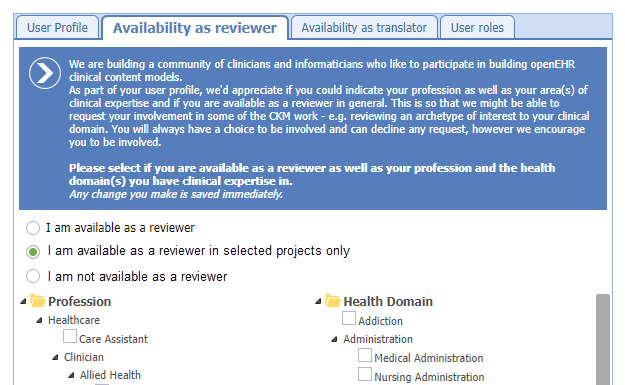Hi, everyone! Happy 2022!
This should possibly also be posted in the Tooling category, I’m not sure how to do that  .
.
In the review process in the CKM I’ve encountered some issues that has to be discussed. I could have just asked for a change in the CKM functionality, but would like to get input from a broader audience first. So here it is:
Normally we invite existing users, and match the domain and experience the users have given when they registered, with the requirement the editors (and for Norway - the editorial board) think is appropriate for the archetype in question. This is normally OK, as long as we have enough users with the required skills.
However, for very specialized archetypes, there is not many (if any) of the registred users with the detailed insight in the medical domain the archetype is about. The editors then have to rely on input from clinicians when the archetype is made - either in a existing project or by gathering a team which will work as a group. This is how the group of archetypes related to genetics were made.
Having such a team is nice, as the group can be trained to understand both how archetypes should be modelled, and how the CKM functionality works when coming to the review process. But leaves a danger of the same persons gives input in the making of the archetypes are the same as reviewing (and accepting) them.
It is hard to find new users, and make them register in the CKM. Within a team or project we can persuade and guide them. But it is far much harder to persuade clinicians and experts not familiar with the openEHR thinking to give feedback. It can be several reasons. Many are just too busy and/or can be reluctant to register because they are afraid of getting spammed. They might not have any direct use of the archetype in a EHR, maybe not ever. They can be afraid of being held accountable for the use of the archetype in a clinical setting.
All this leads to problems finding people to give a proper and reliable peer review.
One example: In a ongoing review of five archetypes related to Artficial reproductive medicine (“In vitro fertilization”) we have only two or three reviewers - one of them being one of the editors, another is a dentist. The invite has been sent to 125 users!
The Norwegian team has sometimes solved this by presenting the archetype for clinicians not registred in the CKM, either in a meeting or by sending a pdf/Word version by mail, and summarize the comments in one of the editors own review, and documenting who made the comments for each element and in the ‘Overall comment’. This is a hack.
I propose a new functionality in the CKM where an editor can send invites to not-registred users by generating a personal link to the archetype review. This link expires after deadline of the review. The user will be regarded as an guest user, and can only be invited manually for each review by editors in the project the archetype is owned by. It will be a task for the editors to either reject the review or accepting it. If accepted, the name of the reviewer will be visible (as normal).
This way we will be able to both have control of who participate in the reviews and also be able to collect input from clinicians or experts who are not able/not interested/too busy/too afraid to registrer themselves as users.
Thoughts?
@natalia.strauch @joostholslag @ian.mcnicoll @heather.leslie @siljelb @sebastian.garde
Kind regards,
Vebjørn
